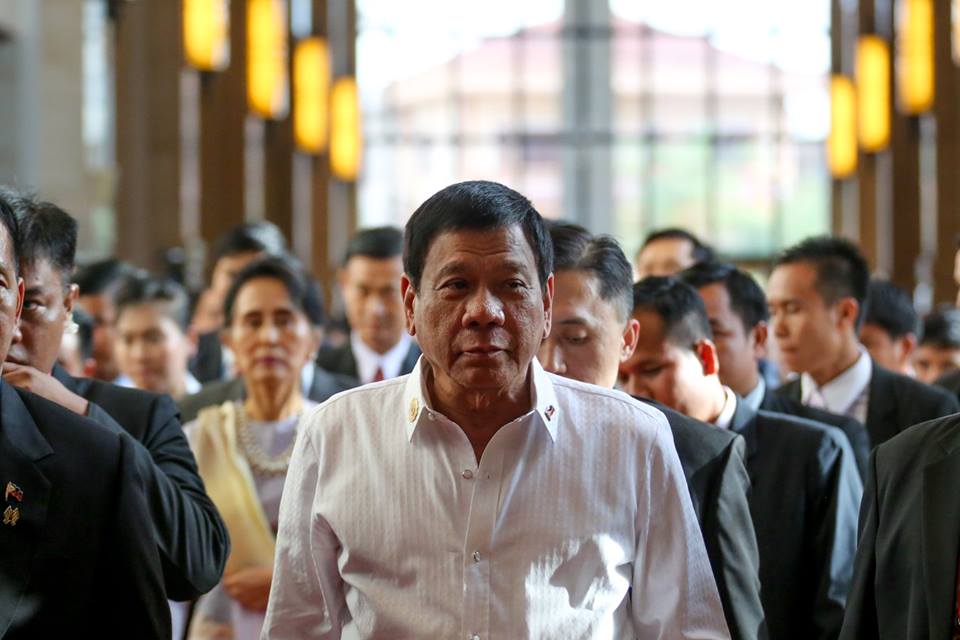Breaking
A look at the first 100 days of Duterte’s turbulent rule

Duterte’s obsessive focus on his deadly crackdown on illegal drugs, a hallmark of his three-decade political career, has single-handedly defined his early days in the presidency. (Photo: President Duterte’s official Facebook page)
MANILA, Philippines—In just 100 days in office, Philippine President Rodrigo Duterte has stirred a hornet’s nest by picking a fight with Barack Obama, the United Nations, the European Union and others who have criticized his brutal crackdown against drugs, which has left more than 3,600 people dead.
In another defining aspect of his unorthodox rule, the 71-year-old Duterte has pushed back his country’s 65-year treaty alliance with the United States, while reaching out to China and Russia.
Highlights of the first 100 days of Duterte’s turbulent presidency:
Anti-drug war
Duterte’s obsessive focus on his deadly crackdown on illegal drugs, a hallmark of his three-decade political career, has single-handedly defined his early days in the presidency. It has become his boon and bane and earned widespread condemnations when he compared it to the Holocaust under Hitler. A rough estimate puts the death toll at about 3,600, including more than 1,300 suspects killed in gunbattles with police — an average of 36 killings a day since he took office on June 30.
The scale of the crackdown has been unprecedented, with the police launching more than 23,500 raids so far and arresting 22,500 suspected drug dealers and addicts. More than 1.6 million houses of drug suspects have been visited by police to invite them to surrender and stop using drugs or disengage from the drug trade.
About 732,000 addicts and dealers have surrendered, apparently for fear of being killed, overwhelming Duterte and the national police, and prompting them to scramble for land and money to build rehabilitation centres.
Duterte’s public threats to kill criminals, especially drug dealers, have helped considerably reduce the crime rate, according to police. A poll by the independent Social Weather Stations last month showed 84 per cent of adult Filipinos were satisfied with his war on drugs, but 94 per cent felt it was important for police to arrest suspects alive, underscoring public worry over the growing body count even in a crime- and insurgency-plagued country long accustomed to deadly violence.
Western governments led by the U.S., the EU, the U.N. and human rights watchdogs are alarmed. Amnesty International says Duterte’s “first 100 days as president have been marked by state-sanctioned violence on a truly shocking scale.”
Uncertainty over the killings, Duterte’s SOB-laced verbal assaults on President Barack Obama, U.N. Secretary-General Ban Ki-moon and other critics, along with flip-flopping government pronouncements, have been partly blamed for foreign selling in the stock market and the peso’s plunge to a seven-year low.
Fraying U.S. alliance
An emerging casualty under the Duterte presidency is the country’s 65-year treaty alliance with the United States, which has been a constant target of his foul tongue. He has had a falling out with Obama, who along with the State Department raised concerns over the widespread drug killings, earning Duterte’s wrath. In a speech this week, he told Obama “to go to hell.”
While critical of the U.S., Duterte has reached out to China and Russia.
Labeling himself as leftist, Duterte wants U.S. counterterrorism forces to leave his country’s south, saying their presence was helping inflame restiveness among minority Muslims and they could be targeted by extremists. He ordered the military not to join the U.S. Navy in planned joint patrols in the disputed South China Sea, and said that an ongoing combat drill by U.S. Marines and their local counterparts, one of 28 joint exercises by the allies each year, would be the last of his six-year presidency.
The U.S. has generally played down the effect of Duterte’s remarks and underscored the Filipinos’ long affinity with America, although Philippine officials have said that some of their U.S. counterparts have privately been concerned about where Washington’s alliance with the Philippines is headed.
Duterte’s moves to limit engagements with visiting American troops will impede Washington’s plans to expand the footprint of U.
S. forces in Southeast Asia to serve as a counterweight to China, including in the South China Sea.
Taming decadeslong rebellions
Duterte’s effort to resume peace talks with communist insurgents who are waging one of Asia’s longest rebellions has led to cease-fire declarations by both sides. With a cease-fire accord forged under his predecessor with the largest Muslim rebel group, the easing of violence involving the communist insurgents has freed up thousands of troops who were redeployed to execute the president’s order to destroy the brutal Abu Sayyaf group, notorious for kidnapping and beheading Western tourists.
Duterte, however, walks a tightrope in handing concessions to the communists, including the release of long-detained insurgent leaders, without unsettling a military that’s in the front line of a bloody conflict that has left between 30,000 to 40,000 combatants and civilians dead in nearly half a century. He has made whirlwind visits to at least 22 military and police camps to explain his counterinsurgency strategy, raffle off pistols and update them on a pledge to double their salaries and improve medical care for combat troops.
A Sept. 2 bomb attack that killed 15 people at a night market in Duterte’s southern hometown of Davao prompted him to declare a “state of lawlessness” to empower the government to harness troops in countering militant threats in urban areas. The attack was a reality check on the complexity of fighting the restiveness that Duterte blames on atrocities against local Muslims by American colonial forces around the early 1900s.























